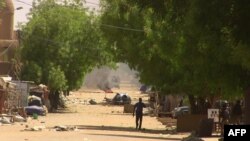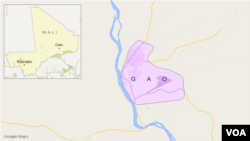Violent protests that were met with deadly force in Mali this week are the latest sign a peace pact between rival ethnic groups is at risk of unraveling, threatening to plunge the nation back into the chaos that made it a launchpad for jihadi attacks.
It has been a year since Tuareg-led separatist rebels signed the accord with the Malian government after a conflict that destabilized this West African country.
The lawlessness created by the fighting allowed militant Islamist groups, including al-Qaida's regional wing, to spread, seize control of the desert north, and launch attacks against targets in Mali and its neighbors.
The U.N.-backed peace deal was supposed to give the government space to tackle this threat. Any signs it could fail will sound alarm bells in Washington and other Western capitals, which have long feared Mali could became a haven for militants to launch jihadi attacks around the world.
Few of the signatories to the accord seem satisfied with it, with all sides dragging their feet on implementation and blaming each other.
No 'gains' seen
"Many things were done on paper and commissions have been set up, but people on the ground haven't enjoyed the gains," said Mohamoudou Djeri Maiga, vice president of the National Movement for the Liberation of Azawad (MNLA), a Tuareg separatist movement that fought to establish an ethnic homeland among the sand dunes and oases of northern Mali.
Anger is also growing among those excluded from its spoils, especially youth groups who backed the state in the conflict but feel they have ended up with nothing.
The tensions have spilled over into violence, with sporadic and deadly clashes taking place in some areas that have pitted groups who backed the government in the conflict against groups linked to the Tuareg and the Arab rebels who fought with them.
In the most overt sign of discontent about the peace deal yet, thousands of protesters gathered Tuesday, burning tires and pelting police with rocks, to voice anger at interim authorities — including former combatants who, under the deal, are supposed to take office this week in Gao and other northern regions.
The army responded by opening fire, killing three people and wounding 33.
"At this point no one is satisfied with the implementation of the agreement," the head of Mali's U.N. peacekeeping mission, Mahamat Saleh Annadif, told Reuters late last month. "The parties signed the agreement, certainly, but each of them has a vision of what they want."
Concerned about the lack of progress, representatives from the U.N. Security Council traveled to northern Mali in March to push for parties to put the agreement into action.
Anger at armed groups
French forces intervened in the former colony in 2013 to drive back Islamist fighters who had hijacked the Tuareg insurgency and seized Mali's north, at one point even threatening the capital, Bamako.
A U.N. peacekeeping mission was then deployed, but militants have exploited continued instability to regroup and carry out a wave of attacks against in Mali, Burkina Faso and Ivory Coast.
Yet Tuesday's protests showed that, even if deal gets implemented, it risks igniting violence among Malians who feel disenfranchised by it.
President Ibrahim Boubacar Keita, mindful of the fragility of the accord and the widespread discontent, gave a special televised address Thursday in which he expressed "deep regret" about the killings at the protests.
"The incidents are regrettable and could have been avoided," he said, but added that the unrest was "an illustration of the poor understanding of the peace deal. It shows we need to work harder for all sections of society to have ownership of it."
If armed, 'you get a role'
Many Malian young people don't think they have misunderstood anything.
"It is clear the agreement means that if you are not armed you get nothing, but if you have weapons you a get a role," said Issouf Alhousseini, local head of the Young Patriots of Gao, a vigilante movement that counts among its members many of the government-allied Songhai ethnic group who now feel alienated.
"The Arabs and Tuaregs have weapons, so they get included. The government should have given us a place, too," he said, showing how the divisions that tore Mali apart still linger.
Amadou Sarr, another Songhai vigilante leader, even suggested that some youths would seek to acquire weapons in order to trade them in for demobilization money.
And as insecurity worsens in northern Mali, economic decline has set in. The tourists who used to visit Timbuktu, a medieval Islamic city that grew fabulously rich off the trade in gold and slaves crossing the sands of the Sahara, have never come back.






